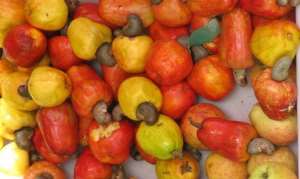
Stakeholders in the Cashew industry have called on government to expedite action on a regulatory framework to further spur the development of the sector.
The stakeholders said the lack of regulation in Ghana's cashew sector was one of the main factors inhibiting growth of the sector, particularly, the processing aspect of the value chain.
Speaking at the opening of a five-day Master Training Programme (MTP) for Cashew sector players from 12 countries in Africa, Ms. Rita Weidinger, Executive Director of the Competitive Cashew Initiative (ComCashew), formerly the African Cashew Initiative, said though Ghana had made strides in development of the cashew sector, the regulatory framework was not yet such that the processing sector can be competitive and needed to be addressed.
She explained that while there were 12 processing factories in Ghana, only three were currently functional.
She said regulation should cover areas like licensing of traders in cashew, with minimum standards in order to sanitise the market. It should also cover quality standards for the cashew, both raw and processed, as it would determine the price of the product on both the domestic and the international market.
'Another area of regulation would be to certify improved planting materials. Farmers should have quality planting material and they should be certified,' she said.
She noted, however, that the industry in Ghana was on the right track, with several interventions by the ministry and partners, which would see the sector overtaking the cocoa sector as a major export commodity, in some 20 years.
Interventions focusing on research and development of improved planting material, initiated by the Ministry of Agriculture and the Cocoa Research Institute, she noted, had led to Ghana becoming one of the highest producers of cashew in the sub-region, producing about 700 kilos per hectares, compared to between 300 and 500 kilos per hectares in the sub-region.
'If we continue in this strides, with the new commitment of government, then the sky is the limit; Ghana can be the centre of excellence for the cashew sector,' she said, adding that the process for the regulations were already underway by government and its partners.
Mr. Kennedy Osei Nyarko, Deputy Minister of Food and Agriculture (MoFA), in charge of Perennial crops, said government recognised the importance of Cashew and the potential it held for rivalling cocoa thus the launch of the 10-year Cashew Development Plan to expand production and promote competitiveness of the cashew value chain.
'Cashew is currently Ghana's leading non-traditional agricultural export crop, raking in about $197 million in revenue in 2016. This constituted about 53 percent of total revenue of $371 million, received from the non-traditional agricultural export sub-sector,' he noted.
He added that the Cashew sector will have a Development Board to provide direction in the implementation of the plan. Government, he said, was also in a tripartite cooperation with Germany and Brazil aimed at complementing technical contributions and applying the knowledge, skills and experiences of the three countries to their cashew industries.
He stressed the need for strong commitment by governments through policy and other interventions to optimise the benefits of the crop, and for knowledge sharing to sustain the momentum in the industry.
Mr Ernest Mintah, Managing Director of the African Cashew Alliance (ACA), noted that increasing processing of cashew from current less than 10 percent processed to about 25 percent will have a tremendous impact on poverty reduction, as it would generate over $100 million in household income for rural families.
This potential is what underscored the need for the Master Training Programme, designed to develop cashew experts endowed with the knowledge and skill in the cashew value chain in order to become change makers.
The programme has trained over 250 experts in the previous edition. The current training is the first session of the fifth edition of the MTP, organised by ComCashew in partnership with the ACA, and with support from the MoFA and the Cocoa Research Institute Ghana.
Attending the training are 77 cashew experts from 12 countries, including Ghana, Nigeria, Burkina Faso, Cote d'Ivoire, Mozambique, Togo, Benin and Sierra Leone.




 This IMANI job no dey pap; the people you are fighting for are always fighting y...
This IMANI job no dey pap; the people you are fighting for are always fighting y...
 Prof. Naana Opoku-Agyemang has changed; you can see a certain sense of urgency –...
Prof. Naana Opoku-Agyemang has changed; you can see a certain sense of urgency –...
 MFWA Executive Director slams Akoma FM for engaging in ‘irresponsible’ media pra...
MFWA Executive Director slams Akoma FM for engaging in ‘irresponsible’ media pra...
 ‘Women must become millionaires too’ — Prof Jane Naana on establishment of Women...
‘Women must become millionaires too’ — Prof Jane Naana on establishment of Women...
 Some believe only in Ghanaian votes, not Ghana — Kofi Asare jabs politicians
Some believe only in Ghanaian votes, not Ghana — Kofi Asare jabs politicians
 Plan to make BEST sole aggregator of Sentuo Oil Refinery will create market chal...
Plan to make BEST sole aggregator of Sentuo Oil Refinery will create market chal...
 2024 elections: I can't have the man I removed from office as my successor — Aku...
2024 elections: I can't have the man I removed from office as my successor — Aku...
 2024 Elections: Immediate-past NPP Germany Branch Chairman garners massive votes...
2024 Elections: Immediate-past NPP Germany Branch Chairman garners massive votes...
 Gov’t focused on making Ghana energy self-sufficient, eco-friendly – Akufo-Addo
Gov’t focused on making Ghana energy self-sufficient, eco-friendly – Akufo-Addo
 April 25: Cedi sells at GHS13.74 to $1, GHS13.14 on BoG interbank
April 25: Cedi sells at GHS13.74 to $1, GHS13.14 on BoG interbank
